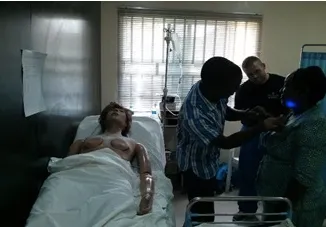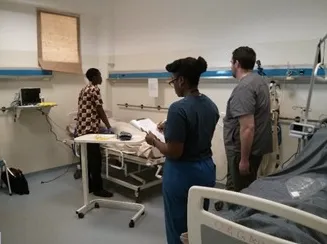An exploration of infection control practice in West Africa

Recap from last blog
In March/ April 2015, a member of the Johns Hopkins team, Dr. Adaora Chima paid preliminary visits to the participating hospitals in Nigeria and Ghana with the following core objectives.
- Identify suitable locations in host hospitals for the training sessions factoring in, lighting, size, access to water for hand washing station and ease of flow of participants between training stations.
- Develop a recruitment strategy with the local coordinating team.
- Determine what modifications might need to be made to the scenarios to accommodate environmental constraints (if any).
- Determine what types of Personal Protective Equipment were available to health workers in the partnering hospitals. This was necessary to ensure that purchased training materials were similar to what is obtainable in the institution.
- Identify a secondary training site to be targeted by participating hospital trainers (on completion of training program).
An exploration of infection control practice in West Africa:
Failure is instructive. The person who really thinks learns quite as much from his failures as from his successes" - John Dewey
In May/ June 2015, the team returned to the partnering hospitals in West Africa to commence training of nurses and physicians using clinical scenarios that had been designed to be relevant to both cadres. The expertise of members of the training team included infection control practice and epidemiology, simulation based training, human factors psychology and comprised of 3 personnel at each site. For logistical reasons, a previously selected site (National Hospital, Abuja, Nigeria) was replaced by University of Nigeria Teaching Hospital, Enugu, Nigeria, for this phase of the program.


Prior to each training session, the participant’s baseline performance was assessed using a survey (for theoretical knowledge of infection control practice) and a clinical simulation scenario depicting an infectious disease endemic to the region, in this case cholera. All personal protective equipment and materials were provided and participants were asked to perform clinical duties on a simulated patient (a mannequin contaminated with simulation germ powder) using any PPE(s) they thought they needed, at any time during their clinical scenarios.
Facilitators were available to assist participants but did not prompt or intervene in decision making. Participants’ choice and technique of PPE adornment was documented using a checklist. On completion of their clinical tasks and exit from the patient area, participants were assessed for personal and environmental germ powder contamination, using a black light that picks up fluorescent powder.
Each participant was trained one on one by a Johns Hopkins Infection control practitioner using a technique called Rapid Cycle Deliberate Practice (RCDP). RCDP utilizes a try and try again approach where participants learn from their mistakes and repeat the tasks until they have achieved proficiency. By using medical simulation, the team presented a risk free environment for participants to err without ‘consequences’ as well as multiple opportunities to practice what they had learned.
On completion of the training session, participants were presented with a different clinical scenario (bacterial meningitis) to manage.
Location Dates Number of participants Trainers identified
Site 1 University of Abuja Teaching Hospital, Gwagwalada, Nigeria May 11-15 30, 5
Site 2 Tamale Teaching Hospital, Tamale, Ghana May 25-29 27, 7
Site 3 University of Nigeria Teaching Hospital, Nigeria June 8-12 36, 9
In total, across the 3 hospitals, 93 health workers were trained and 20 local trainers were identified. The local trainers will be conducting training sessions at secondary training sites.
In an earlier blog entry, we emphasized the need for numerous rehearsals to iron out any potential issues in the designed scenarios. As often happens when translating science from the bench or an ideal environment like a lab to the real world, the training team had to make modifications at each training site.
- Single training rooms were demarcated into multiple training stations using privacy screens.
- Alcohol Based Hand Rub was a prevalent choice for hand hygiene because of limited hand washbasins or running water at training stations.
- Sometimes trainers holding water-dispensing cups ‘controlled’ the water flow under the instruction of participants demonstrating hand-washing techniques. Veronica buckets (plastic buckets with dispensing faucets) were also put into use when available.
- Paper forms were used to complete demographic and knowledge data during electricity or Internet network shortages.
Where we are now:
- Training has been conducted in 3 partnering hospitals in West Africa
- Local training teams at each partnering hospital are currently coordinating efforts to conduct training in secondary hospitals. This constitutes the train the trainer arm of this project.
- The first edition of the training manual on simulation based infection control training is ready and has been distributed to local training teams in partnering hospitals to facilitate their training sessions.
- Data from the primary training sessions is being entered into databases in preparation for analysis.
We’ve created a small photo gallery to provide a more visual synopsis of our experience.
Please look for our monthly updates on this blog to read more about our use of simulation to train health workers on preventative infection control measures. Please feel free to contact us with inquiries you may have by sending an email to Adaora M Chima, MBBS, MPH ([email protected]) or Benjamin H Lee, MD, MPH ([email protected])
Stay updated
Sign up for our newsletter to receive regular updates on resources, news, and insights like this. Don’t miss out on important information that can help you stay informed and engaged.
Explore Elrha
Learn more about our mission, the organisations we support, and the resources we provide to drive research and innovation in humanitarian response.


.png)